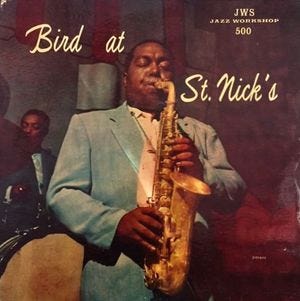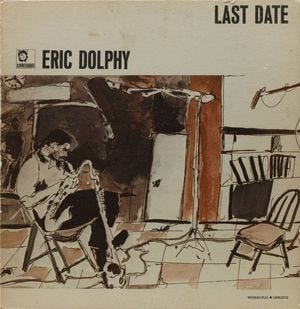Some Jazz Records: Faruq Z. Bey Clippings
Comments on recordings from musicians and other actors of the jazz scene. Random and not-so-random listening cues from the archives.
Charlie Parker, Bird at St. Nick’s, Jazz Workshop JW-500, 1957, LP.
"[John Coltrane] went out because there was no place else to go," saxophonist Faruq Z. Bey told Gerald E. Brennan during interviews published in Cadence. "He had exhausted the bebop-swing approach, chord changes and all that thing. To get to a fresher, newer sound. But then I’ve got a theory that that’s pretty much the way it goes. I heard a recording of Charlie Parker at St. Nicholas Ballroom up in Harlem back in the day before he passed. The rhythm section was cranking out the chord changes, two-five-one, straight up and down. But Bird sounded just like Eric Dolphy. Because that was the logic of it. That was the next step. You pursued that approach, chords and all that kind of thing. And you started playing the logical extension of that." One of the few non-studio Parker recordings available early on, this raw 1950 tape was first released on Charles Mingus’s Jazz Workshop label.
Eric Dolphy, Last Date, Limelight LM-82013 (LS-86013), 1965, LP.
"There’s some recording Eric Dolphy said, 'You hear music, it’s gone into the air and you can never hear it again.' And that says an awful lot to me. That defined the music. And if you do hear it again, it’s not music. A recording is not music, it’s a recording," Faruq Z. Bey told Cadence. A very short portion of the audio of the Dolphy interview during which he made the famous comment referenced by Bey was added after the final notes of Last Date, an album released the year after the altoist’s death. "When you hear music it’s gone. So the artifact is gone. The process is what matters," Bey further commented. "It’s just about realizing what it is. It’s a frozen artifact, at that moment. And when you consider all the variables, all the forces that are affecting it, you can’t reproduce it anyway. So the reproduction itself is a synthetic… Is false. It’s a moment out of context actually. But for learning things it’s invaluable. For seeing form, isolated like that."
John Coltrane, Kulu Sé Mama, Impulse! A(S)-9106, 1967, LP.
Faruq Z. Bey acknowledged John Coltrane and Pharoah Sanders as major influences, but he did not discuss specific recordings in the sources accessed for this piece. However, Northwoods Improvisers bassist and collaborator Mike Johnston recalls Bey commenting on the topic. "Around 2005, a group of friends were discussing the idea of hearing recordings as album sides rather than as full length CDs," Johnston wrote in an email. "I posed the question of great LP sides to Faruq and he responded with Kulu Sé Mama without hesitation. He said something to the effect of, 'I like it all, it’s both old and late period Trane blended together, rooted in mother Africa. Trane plays lyrically throughout the whole piece and Pharoah in turns plays layers of overtones, often simultaneously with Trane. It’s all there, everything.'"
Griot Galaxy, Kins, Black & White 001, 1982, LP.
Faruq Z. Bey’s initial foray into avant-garde playing took place within a band called the First African Primal Rhythm Arkestra. Its music was never documented on a commercial recording and, for quite a while, this was also true of Griot Galaxy, the group with which Bey then played in the 1970s. "The way the business operates, no matter how polished you are, it’s a commodity situation," Bey told W. Kim Heron for a 1981 Detroit Free Press article. "You have to have something that someone can point to and say, 'Someone trusted them enough to do this.' That’s what we’ve been hearing. We sent our demo [tapes] and people say we sound great, but where is the record? Now we’re gonna give them the record and see what they say." At the time of his talk with Heron, Griot Galaxy had recently taped Kins, an album that would be issued on a one-shot label the next year. (See also Heron’s 2003 Metro Times article on Bey and Griot Galaxy. Also note that Entropy Stereo has just released a previously unheard tape from this exact era, Atlan-tan Suite.)








Thanks for remembering Faruq Z. Bey - and among such esteemed company.